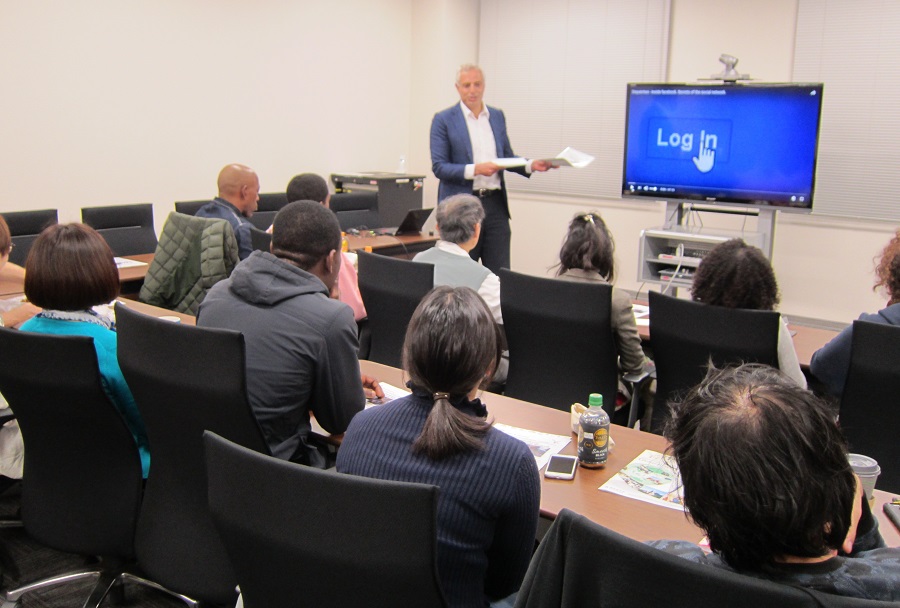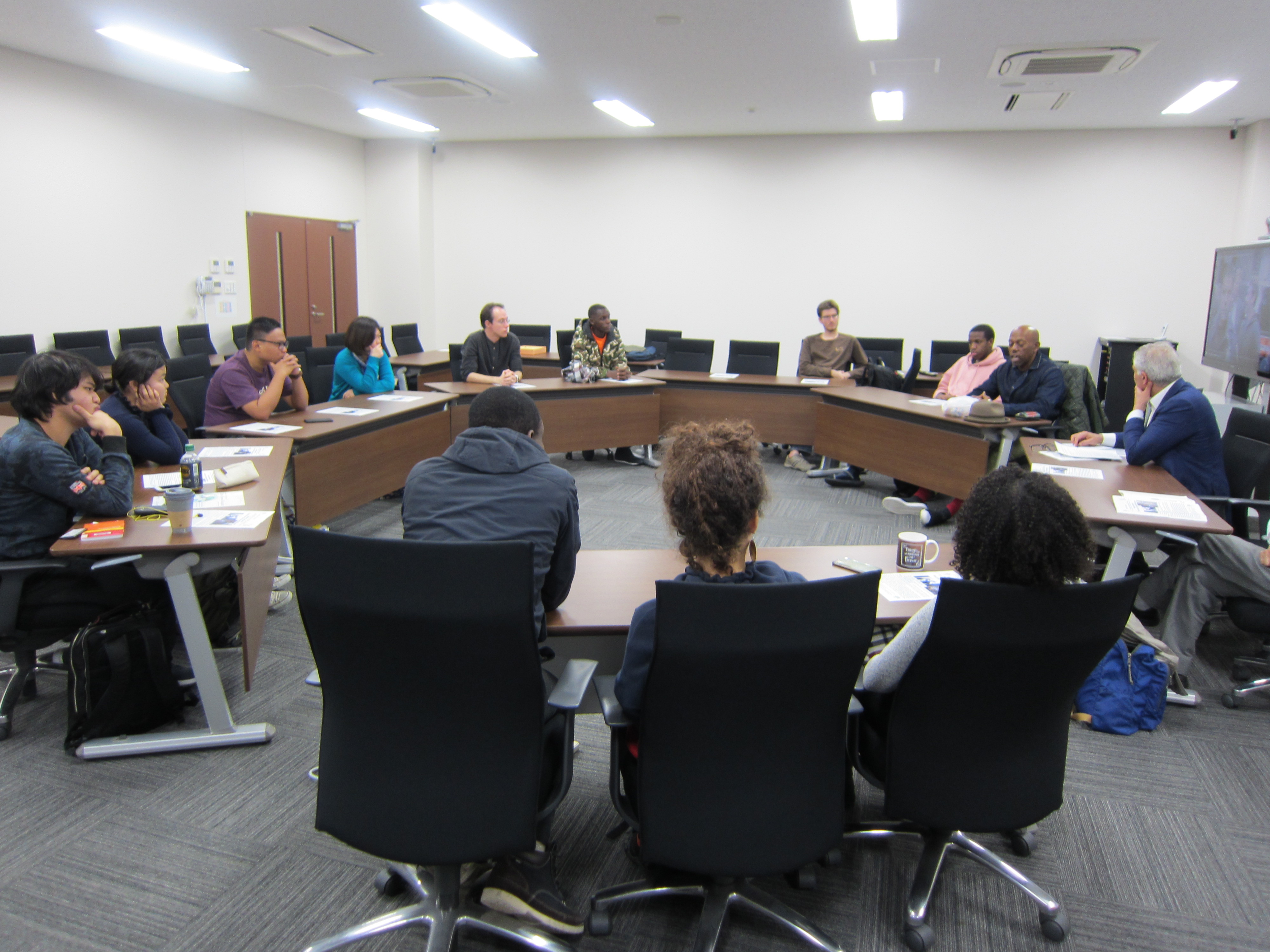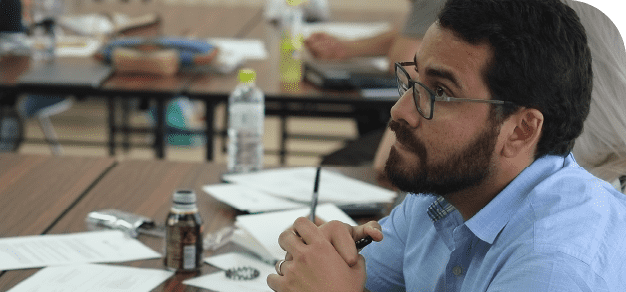Recent Activities
GRM Monthly Documentary Film Event - November
2018/12/03
A documentary film event was held on Thursday, 15 November.
We watched a film, titled
“Inside Facebook: Secrets of the Social Network”.
----------------------------
Date: Thursday, 15 November 2018
Time: 17:30 P.M. - 19:30 P.M.
Venue: Meeting Room, Shikokan Building,
Karasuma Campus, Doshisha University
----------------------------
Written by Iyas Salim, PhD
Advanced Research and Education, Doshisha University
This November documentary-film event was about one of the biggest global platforms of Social media. Facebook is the target of a recent investigative journalistic film to examine controversies about published material and videos. It is estimated that 1.5 billion people actively use Facebook. The stakes are high. Many millions are bound to be influenced by the type of video posted on the social media platform. The film examines several cases such as child abuse, hate speech, violence, etc. It attempts to expose extremities of disturbing contents and find out why such material remain online and not removed? Interviewed specialists and experts point out the driving motive for maintaining disturbing and questionable material on Facebook. Extreme contents, such as hate speech or violence, attract many more viewers and consequently generate more profits. Advertisement using Facebook platform is a major income for the vast social media outlet. The higher number of users mean more money and financial gains for Facebook. Int other words, controversy makes money for Facebook. It is like an addiction of drugs as one expert and former mentor of Facebook founder explained. And there are more allegations against Facebook interfering in politics and elections.
In early 2018, Facebook faced allegations of interfering with the U.S. elections by tampering into personal data of millions of users’ profiles. Specifically speaking, a data analytic firm, Cambridge Analytical, allegedly worked for the presidential campaign of Donald Trump. As recently as November of this year, the New York Times published a report saying Facebook keeps running into scandal after another from data sharing, Russian meddling to hate speech. Such scandals created a backlash by the congress and consumers. In response, Facebook executives refused to live up to the serious proplem of compromising the privacy of people. As Facebook grew, so propaganda and hate speech. It has become a tool of government indoctrination and ethnic cleansing in countries such as Myanmar, India and German, the reported explained.
A discussion followed the screening of the documentary film. Almost all participants who watched the film, young and old, professional and students, use Facebook. The debate was lively and intimate as participants talk about both the story in the film and their own encounter/living with Facebook. One participant who hails from Guinea Conakry in west Arica, explained that Facebook has become a media platform which agitates ethnic strife in his country. Guinea Conakry consists of mainly two ethnic groups; the Fulani and Mandinka. Fulani ethnicity is the largest. He believes Facebook adds up to fueling ethnic strife. Another participating member expected the film to report more on matters such as surveillance and profiling by government, police and established institutions.
Is using Facebook a problem, one asked? Facebook is not the problem, one participant explained. It is how we use it. What we upload is a responsibility of an individual, said the participant. “Technology itself is neutral. It is what we do with it determines the outcome,” he said. A participant from Kyoto University expressed his take on the matter, saying Facebook is a public space but without public accountability. There are no laws governing such public space. Participating professor from the Graduate School for Global Studies, Doshisha University, warned of what is called “digital footprint.” He cautioned young university students of what they say or upload on the Facebook or any other social medial platform like Instagram, etc. What one posts can fire back later in life. Some universities in the U.S. carry out background check on university applicants by googling the name and person’s postings on social media. Young students need to be aware of this.
Is Facebook addicting? Participating members of the discussion answered this question differently. Some admitted using Facebook can waste time and affecting their study time. It is distracting, said one student. He admitted he could not keep away for long from Facebook and other social media outlets. “Not really,” reflected another. “In the past, we used to waste time by listening to music or watch TV or listening to Radio. We had to decide when to stop. And the same with Facebook now or online social media,” he continued. One students, researching on Syrian refugees and social media in Lebanon elaborated on the use of Facebook and generation gap. When she asked refugees on the whether to use online social media or not to use it, for young refugees in Lebanon this simply was not a question. Older people expressed pros and cons of using social media. Facebook and social media is a given thing for young Syrian refugees. Not using social media is out of the question, the researcher affirmed.
Is Social media technology controlling us? As the round table discussion came to a close, we tried to end with a conclusion. One present IT expert explained his own objection of using Facebook. It is not a human to human interaction, he said. Facebook communication does not bring happiness to people, he further commented. An IT researcher, attending the discussion, attempted to provide a concluding remark. He said designers of technology prevent their kids form using social media technology.





